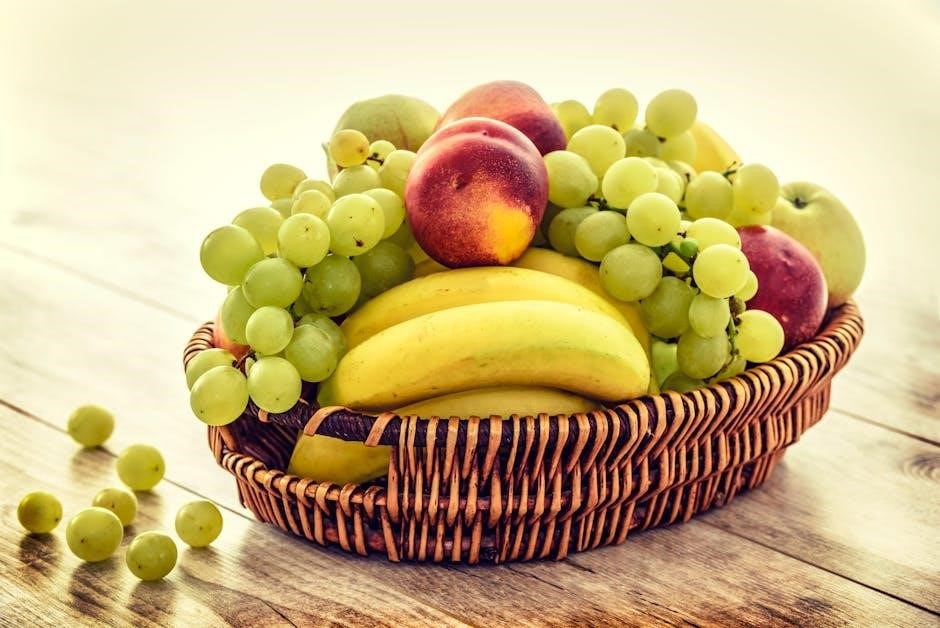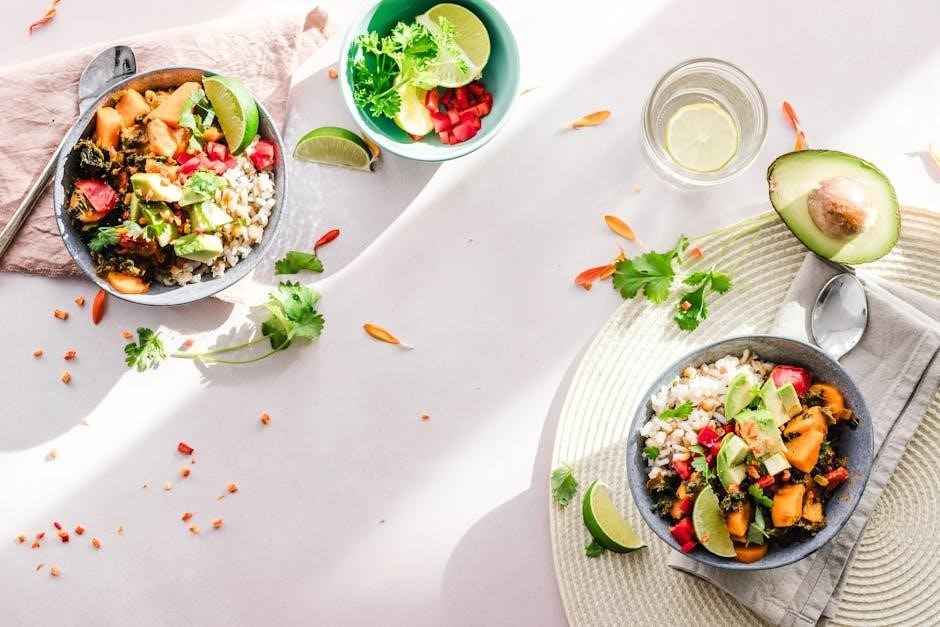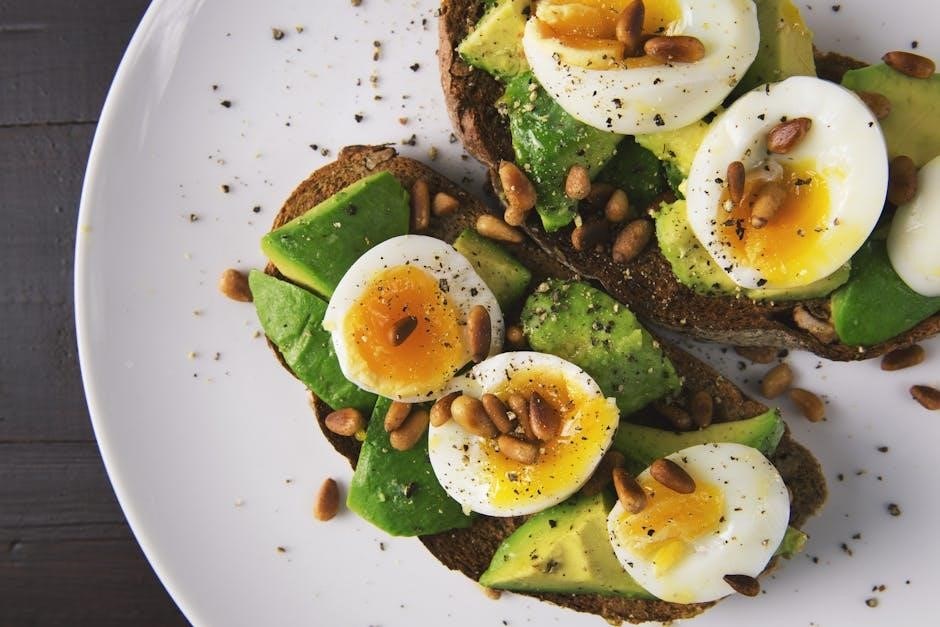A tailored peptic ulcer diet plays a crucial role in managing symptoms‚ promoting healing‚ and preventing complications. It focuses on balancing nutrition while avoiding triggers that irritate the stomach lining.
1.1 Importance of Diet in Managing Peptic Ulcers
Diet is a cornerstone in managing peptic ulcers‚ helping alleviate symptoms like pain and discomfort. A well-balanced diet reduces stomach acid irritation‚ promotes healing‚ and prevents complications. By avoiding acidic‚ spicy‚ or high-fat foods and incorporating healing foods like probiotics and fiber‚ individuals can significantly improve their condition. A tailored dietary approach supports overall gut health and aids in long-term recovery.
1.2 Overview of Peptic Ulcer Disease
Peptic ulcer disease involves sores in the stomach lining or upper intestine. Common types include gastric ulcers (in the stomach) and duodenal ulcers (in the small intestine). Symptoms often include abdominal pain‚ nausea‚ and bloating. Causes include H. pylori infection‚ NSAIDs‚ and excess acid production. Managing the condition involves medical treatment and dietary adjustments to promote healing and prevent recurrence.

Understanding Peptic Ulcers
Peptic ulcers are open sores in the stomach lining or upper intestine‚ often caused by H. pylori infection‚ NSAIDs‚ or excess stomach acid. Diet plays a key role in managing symptoms and promoting healing.
2.1 Definition and Types of Peptic Ulcers
Peptic ulcers are open sores in the stomach lining or upper intestine‚ causing pain and discomfort. They are categorized into gastric ulcers (stomach) and duodenal ulcers (intestine). These ulcers often result from H. pylori infection‚ NSAID use‚ or excessive stomach acid. Understanding their types and causes is essential for effective management and dietary adjustments to alleviate symptoms and promote healing.
2.2 Common Symptoms and Risk Factors
Peptic ulcers often cause a burning or gnawing pain in the upper abdomen‚ which may improve with antacids or eating. Symptoms also include nausea‚ bloating‚ and sometimes vomiting. Risk factors include NSAID use‚ H. pylori infection‚ smoking‚ alcohol consumption‚ spicy or fatty diets‚ stress‚ and genetic predisposition. Older adults and those with a family history of ulcers are also at higher risk.

General Dietary Principles for Peptic Ulcers
A balanced peptic ulcer diet focuses on high-fiber‚ low-acid foods‚ lean proteins‚ and whole grains to manage symptoms and promote healing while minimizing stomach irritation.
3.1 Foods to Avoid
Individuals with peptic ulcers should avoid acidic foods like citrus fruits and tomatoes‚ spicy dishes‚ high-fat foods‚ caffeine‚ alcohol‚ and processed meats. These can irritate the stomach lining‚ worsening symptoms and delaying healing. Additionally‚ avoiding NSAIDs and smoking is crucial‚ as they can exacerbate ulcer conditions. A tailored diet focusing on bland‚ easily digestible foods helps reduce discomfort and promotes recovery.
3.2 Foods to Include
A well-balanced diet rich in whole grains‚ vegetables‚ and lean proteins supports healing. Incorporate probiotic-rich foods like yogurt and kefir to promote gut health. Opt for low-fat dairy‚ fish‚ and poultry‚ and consider eating several small meals throughout the day to manage symptoms effectively. These choices help reduce stomach irritation and foster a conducive environment for ulcer recovery.
3.3 Role of Fiber in the Diet
A high-fiber diet aids in absorbing excess stomach acid‚ reducing inflammation and irritation. Foods like whole grains‚ vegetables‚ and fruits (especially bananas and applesauce) are beneficial. Fiber promotes healing‚ prevents future ulcers‚ and supports overall digestive health. Incorporating fiber-rich foods gradually helps avoid digestive discomfort‚ ensuring a gentle and effective approach to managing peptic ulcers.
Foods to Avoid in Peptic Ulcer Diet
Eliminating acidic‚ spicy‚ and high-fat foods is essential to reduce discomfort and promote healing. Avoid citrus fruits‚ tomatoes‚ caffeine‚ alcohol‚ and processed meats to minimize stomach irritation.
4.1 Acidic Foods and Drinks
Acidic foods and drinks‚ such as citrus fruits‚ tomatoes‚ and vinegar‚ can worsen peptic ulcer symptoms by increasing stomach acid production. Avoiding these items helps reduce irritation and discomfort. Examples include oranges‚ lemons‚ grapefruits‚ and tomato-based products. Opt for non-acidic alternatives like herbal teas or alkaline beverages to support healing and maintain a balanced digestive environment.
4.2 Spicy and High-Fat Foods
Spicy foods‚ such as chili peppers and hot sauces‚ can irritate the stomach lining‚ worsening peptic ulcer symptoms. Similarly‚ high-fat foods like fried items‚ greasy meats‚ and heavy desserts slow digestion and increase acid production. Avoiding these helps reduce discomfort and promotes healing. Opt for mild seasonings and lean proteins to maintain a balanced diet without triggering pain or inflammation.
4.3 Caffeine‚ Alcohol‚ and Smoking
Caffeine‚ alcohol‚ and smoking can exacerbate peptic ulcer symptoms by increasing stomach acid production and irritating the stomach lining. Caffeine‚ found in coffee and tea‚ can stimulate acid secretion‚ while alcohol directly damages the mucosal barrier. Smoking also impairs healing and increases acid production. Avoiding these factors is essential for managing symptoms and promoting recovery from peptic ulcers.
Recommended Foods for Peptic Ulcers
A diet rich in whole grains‚ vegetables‚ lean proteins‚ and probiotic-rich foods can help soothe and heal peptic ulcers while providing essential nutrients for overall health.
5.1 Lean Proteins and Poultry
Lean proteins like chicken‚ turkey‚ and fish are excellent choices for a peptic ulcer diet. They provide essential nutrients without causing stomach irritation. Opt for skinless‚ low-fat options and avoid frying. Additionally‚ plant-based proteins such as tofu and legumes are beneficial. These foods support healing and maintain overall health without triggering symptoms.
5.2 Whole Grains and Vegetables
Whole grains and vegetables are key components of a peptic ulcer diet‚ providing essential fiber‚ vitamins‚ and minerals. Oats‚ quinoa‚ broccoli‚ and leafy greens are excellent choices as they are easily digestible and non-irritating. These foods support healing by reducing inflammation and promoting a healthy digestive system. Incorporating them helps balance nutrients and aids in preventing future ulcers by naturally reducing stomach acid production.
5.3 Probiotic-Rich Foods
Probiotic-rich foods like yogurt‚ kefir‚ and fermented vegetables support gut health by restoring beneficial bacteria. These foods can help reduce inflammation and improve digestion‚ which is crucial for healing peptic ulcers. Incorporating them into meals enhances the gut microbiome‚ aiding in the prevention of future ulcers and promoting a balanced digestive system.
Meal Frequency and Portion Control
Probiotic-rich foods‚ such as yogurt and kefir‚ support gut health by restoring beneficial bacteria. These foods can help reduce inflammation and improve digestion‚ which is crucial for healing peptic ulcers. Incorporating them into meals enhances the gut microbiome‚ aiding in the prevention of future ulcers and promoting a balanced digestive system.
6.1 Benefits of Frequent‚ Small Meals
Eating smaller‚ more frequent meals helps manage peptic ulcer symptoms by reducing stomach acid production. This approach prevents overloading the stomach‚ minimizing irritation and discomfort. Regular‚ balanced meals maintain steady digestion‚ avoiding hunger-induced acidity spikes. This method supports healing‚ reduces pain‚ and promotes a stable digestive environment‚ essential for recovery and long-term remission from peptic ulcers.
6.2 Avoiding Overeating and Fasting
Overeating can overload the stomach‚ increasing acid production and worsening symptoms. Similarly‚ fasting for long periods can lead to excessive acid buildup‚ causing discomfort. Balancing meals and avoiding extremes helps maintain steady digestion‚ reducing irritation and promoting a healing environment for peptic ulcers. This approach minimizes discomfort and supports overall digestive health effectively.

Lifestyle Modifications
Lifestyle changes‚ such as weight management‚ stress reduction‚ and avoiding cigarettes‚ alcohol‚ and NSAIDs‚ play a crucial role in managing peptic ulcers and preventing recurrence.
7.1 Weight Management
Maintaining a healthy weight reduces stomach pressure and acid reflux‚ which can worsen peptic ulcers. A balanced diet combined with regular exercise helps achieve and sustain weight goals‚ improving overall health and reducing ulcer recurrence risk.
7.2 Stress Reduction Techniques
Chronic stress can exacerbate peptic ulcers by increasing stomach acid production. Techniques like mindfulness‚ deep breathing‚ yoga‚ and progressive muscle relaxation help reduce stress. A calm mental state contributes to better digestion and healing‚ complementing dietary adjustments for effective ulcer management.
7.3 Avoiding NSAIDs and Certain Medications
Nonsteroidal anti-inflammatory drugs (NSAIDs) and certain medications can irritate the stomach lining‚ worsening peptic ulcers. Patients should consult their doctor before using these drugs. Alternatives like acetaminophen may be recommended. Avoiding NSAIDs is crucial for healing and preventing further damage‚ ensuring the effectiveness of dietary and medical treatments for peptic ulcer management.
Sample 1-Day Meal Plan
- Breakfast: 2 cups whole grain cereal‚ 1 cup skim milk‚ 1 banana‚ herbal tea.
- Mid-Morning Snack: 12 saltine crackers‚ 2 oz colby cheese.
- Lunch: 3 oz turkey wrap with spinach‚ 1 cup fruit yogurt.
8.1 Breakfast Options
Start your day with gentle‚ easy-to-digest foods. Opt for whole grain cereals‚ bananas‚ and herbal teas. Skim milk or low-fat yogurt can also be included. Avoid acidic juices like orange or grapefruit. Incorporate lean proteins such as scrambled eggs or turkey slices. A balanced and bland breakfast helps manage morning symptoms and sets a positive tone for the day.
8.2 Mid-Morning Snacks
Choose snacks that are gentle on the stomach. Options include whole grain crackers with low-fat cheese or a small serving of probiotic-rich yogurt. Fresh bananas or applesauce are also excellent choices. Avoid spicy‚ acidic‚ or high-fat snacks. Opt for small portions to prevent overwhelming the digestive system and maintain comfort throughout the morning.
8.3 Lunch and Dinner Ideas
For lunch and dinner‚ focus on lean proteins like grilled chicken or fish‚ paired with steamed vegetables or whole grains. Include low-acid vegetables such as carrots‚ spinach‚ or green beans. Use mild seasonings and avoid spicy or fatty sauces. Incorporate small portions of whole grain rice or quinoa for fiber. Ensure meals are balanced and easy to digest to support healing and comfort.

Managing Specific Dietary Challenges
Identifying and avoiding trigger foods while balancing nutrients is key to managing dietary challenges effectively‚ ensuring proper healing and minimizing discomfort for peptic ulcer patients.
9.1 Dealing with Food Sensitivities
Identifying food sensitivities is crucial for managing peptic ulcers. Common triggers include dairy‚ gluten‚ and spicy foods. Keeping a food diary can help track symptoms and identify problematic items. Gradual reintroduction of suspected foods after a period of avoidance can confirm sensitivities. Consulting a dietitian or healthcare provider can provide personalized strategies for long-term management and symptom relief.
9.2 Balancing Nutrients for Healing
Balancing nutrients is essential for healing peptic ulcers. Focus on high-fiber foods‚ lean proteins‚ and whole grains to support gut health. Incorporate fruits‚ vegetables‚ and probiotic-rich foods like yogurt to aid digestion and reduce inflammation. Avoid excessive fat and sugar‚ and stay hydrated to maintain a healthy digestive system. A well-rounded diet ensures proper nutrient absorption and promotes tissue repair‚ reducing the risk of future ulcers.
Role of Supplements
Supplements like probiotics support gut health‚ while antacids reduce stomach acid. Avoid NSAIDs and irritants to promote healing and prevent further damage.
10.1 Probiotics and Gut Health
Probiotics play a key role in maintaining gut health by balancing beneficial bacteria in the stomach. Foods rich in probiotics‚ such as yogurt and kefir‚ can aid in healing peptic ulcers by reducing inflammation and improving the stomach lining’s resistance to acid. This natural approach supports overall digestive well-being and may enhance the effectiveness of medical treatments.
10.2 Antacids and Acid-Reducing Supplements
Antacids and acid-reducing supplements are essential in managing peptic ulcers by neutralizing stomach acid and alleviating symptoms like heartburn and discomfort. These supplements‚ including histamine-2 (H2) blockers and proton pump inhibitors (PPIs)‚ help create a less acidic environment‚ promoting healing. They are often recommended alongside dietary changes to effectively control symptoms and support the recovery process for individuals with peptic ulcers.
Monitoring Progress
Tracking symptoms and adjusting the diet or treatment plan is crucial. Regular medical check-ups ensure the ulcer is healing and prevent future complications or relapses effectively.
11.1 Tracking Symptoms and Adjustments
Monitoring symptoms like pain‚ heartburn‚ or digestion issues helps assess the diet’s effectiveness. Adjustments may include modifying food choices or portion sizes based on individual responses. Keeping a food diary can identify triggers and aid in personalizing the diet plan. Regular follow-ups with healthcare providers ensure the ulcer is healing and prevent potential complications or relapses.
11.2 Regular Medical Follow-Ups
Scheduled consultations with healthcare providers are essential for monitoring healing progress and adjusting treatment plans. Regular endoscopies and blood tests help confirm ulcer recovery and rule out complications. Open communication with doctors ensures personalized advice and timely interventions‚ supporting long-term remission and overall digestive health.
Long-Term Remission Strategies
Maintaining a healthy weight‚ avoiding irritants like alcohol and NSAIDs‚ and adhering to a balanced peptic ulcer diet are key for sustained healing and preventing recurrence.
12.1 Maintaining a Healthy Weight
Maintaining a healthy weight reduces stomach pressure‚ lowering acid reflux risk. A balanced peptic ulcer diet rich in fruits‚ vegetables‚ and whole grains supports weight management. Portion control and regular exercise help prevent obesity‚ a known risk factor for peptic ulcers. Monitoring progress and adjusting dietary habits ensure long-term remission and overall well-being;
12.2 Avoiding Triggers
Identifying and avoiding specific triggers is essential for long-term remission. Common triggers include acidic‚ spicy‚ or high-fat foods‚ caffeine‚ alcohol‚ and smoking. By eliminating these irritants‚ individuals can reduce inflammation and prevent relapses. Tailoring the diet to personal triggers ensures a more effective approach to managing peptic ulcer symptoms and promoting healing.

Resources and Further Reading
Consult PDF guides and reputable websites for detailed meal plans and research. Websites like myrtuemedical.org offer comprehensive resources on managing peptic ulcers through diet.
13.1 Recommended PDF Guides
Downloadable PDF guides provide comprehensive insights into managing peptic ulcers. Resources like the Bland Diet for Peptic Ulcer from Myrthua Medical and others offer detailed meal plans‚ symptom relief strategies‚ and food lists. These guides often include practical advice on balancing nutrition‚ reducing acid triggers‚ and incorporating probiotics. They are valuable for both patients and caregivers seeking structured dietary approaches to healing and prevention.
13.2 Online Communities and Forums
Online communities and forums offer valuable support for managing peptic ulcers. Platforms like Regional Digestive Consultants and health-focused forums provide shared experiences‚ dietary tips‚ and guidance. They connect patients with experts and others facing similar challenges‚ fostering a supportive environment for discussing symptoms‚ treatments‚ and lifestyle adjustments. These resources complement PDF guides by offering real-life insights and practical advice for daily management.
Adopting a balanced diet is key to managing peptic ulcers. Avoiding acidic‚ spicy‚ and high-fat foods while focusing on whole grains‚ lean proteins‚ and probiotics aids healing and prevents recurrence effectively.
14.1 Summary of Key Points
A well-balanced diet is essential for managing peptic ulcers‚ focusing on avoiding acidic‚ spicy‚ and high-fat foods. Incorporate whole grains‚ lean proteins‚ and probiotics to aid healing. Stay hydrated‚ eat smaller‚ frequent meals‚ and avoid triggers like caffeine and alcohol. Regular monitoring and lifestyle changes‚ such as stress reduction‚ further support long-term remission and overall gut health.
14.2 Final Tips for Managing Peptic Ulcers
Adhere to a balanced diet‚ avoiding acidic and spicy foods. Stay hydrated‚ eat smaller meals‚ and avoid alcohol and smoking. Manage stress through relaxation techniques and maintain a healthy weight. Regularly monitor symptoms and adjust your diet as needed. Consider probiotics and fiber-rich foods to support healing. Consult your healthcare provider for personalized advice and ensure regular follow-ups for optimal recovery.
